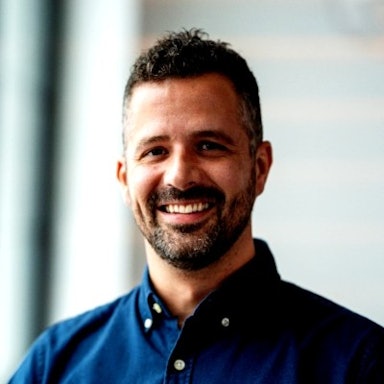Building a Culture Where People Can Actually Thrive

Raya Moshiri
17 June 2025

Content
- Building a Culture Where People Can Actually Thrive
- It starts with self-care (the kind that actually matters)
- Culture change means going beyond surface-level
- Leadership is everything (and people are paying attention)
- Flexibility isn’t a perk – it’s the baseline
- Where are we now with mental health?
- Final thought
Building a Culture Where People Can Actually Thrive
A lot’s changed over the last few years. Not just where we work, but how we think about work – what we’re willing to tolerate, what we’re no longer willing to hide, and what we expect in return.
This came through loud and clear at the From Day One conference in Manhattan, where Unmind’s Chief Growth Officer, Matt Jackson, joined a panel alongside Peter Johnson (NRG), Amy Onori (Publicis Media), Diana Blancone (Omnicom Media Group), and Chad Deshler (Lifespeak) to discuss building stronger, more connected workplace cultures. The conversation covered a lot – burnout, trust, flexibility, even the emotional weight people carry into meetings without saying a word.
And it landed on one key point:
People don’t want performative wellbeing policies. They want to feel genuinely supported, in the moments that matter, not just in a slide deck.
So what does that look like in practice?
It starts with self-care (the kind that actually matters)
This term gets thrown around a lot, but we’re talking about the real kind – the kind that’s baked into how a company operates. Not a mindfulness app buried on your intranet. Not a one-off “wellness week.”
Here’s the reality: people are exhausted. They’re managing caregiving, stress, financial worries, health issues, and everything in between, while still trying to show up and deliver.
Most don’t need more tools. They need fewer barriers. There are 10,000+ wellbeing apps out there. But if they’re hard to access or don’t reflect what people actually need? They sit untouched. In fact, only 5% of mental health apps are backed by any scientific evidence at all (Unmind Lab) – making it even harder for people to find real, effective support.
So before launching something new, it’s worth asking: Is this meaningful? Is it backed by science? Or are we just adding more noise to an already noisy space?
Culture change means going beyond surface-level
"Leadership isn’t about titles; it’s about how you show up, every day."

We’re past the point where free snacks and “Summer Fridays” can cover up a culture that’s not working.
People are watching how their leaders behave. They notice who takes time off – and who never does. They notice which conversations are welcomed and which get shut down.
But here’s the good news: more companies are paying attention. The focus is shifting from quick fixes to long-term culture change. And that starts with investing across all areas of wellbeing:
- Mental – making therapy, coaching, and mental health days standard
- Physical – recognizing that sleep, energy, and movement aren’t “nice-to-haves”
- Financial – helping people feel secure in a very uncertain world
- Social – creating space where people can connect, not just collaborate
When people feel supported in these areas, they’re more creative. More present. More likely to stay.
Leadership is everything (and people are paying attention)
"Leadership isn’t about titles; it’s about how you show up, every day," explained Matt.
"Our CEO at Unmind sets boundaries visibly and consistently, and encourages others to do the same. That kind of leadership has a ripple effect. When someone senior models balance, it gives the whole team permission to do the same."
Culture flows from the top. If people see long hours, skipped breaks, and constant availability, that becomes the expectation. But if they see openness, balance, and care – that becomes the culture. It doesn’t have to be perfect. But it does have to be real.
Flexibility isn’t a perk – it’s the baseline
Let’s not sugarcoat it, 60% of female caregivers have left the workforce because they didn’t feel supported.
That stat should be a wake-up call.
People’s lives don’t fit neatly into a 9 to 5 anymore (if they ever did). They need flexibility that’s real, not just policy-level. And more importantly, they need to be trusted to use it, without guilt, without side-eyes.
This means:
- Taking time off and not feeling the need to apologize for it
- Being transparent about personal boundaries
- Saying no to unnecessary late meetings, and encouraging others to do the same
It’s not about being soft. It’s about building workplaces that are sustainable.
Where are we now with mental health?
There’s progress – and still a long way to go.
In some industries, it’s now common to talk openly about mental health. In others (like law, finance, and even healthcare), stigma is still very real.
That’s where leadership and culture collide. Because reducing stigma doesn’t happen in a single workshop. It happens in what’s modelled, what’s normalised, and what’s supported, over time.
Gen Z is helping push the conversation forward. They expect their employers to care. And they’re not afraid to ask for better.
But across generations, what matters is this:
- Are your managers equipped to have meaningful conversations?
- Is rest celebrated – or quietly punished?
- Are you addressing burnout before it becomes unfixable?
- Do people feel safe showing up as they are?
Final thought
"When someone senior models balance, it gives the whole team permission to do the same."

If you want to build a culture where people thrive, start small.
Make wellbeing easy to access. Make your values visible. Trust your people to know what they need.
Because at the end of the day, most people won’t remember the policy doc.
- They’ll remember how their manager responded when they said they were struggling.
- They’ll remember if it felt safe to speak up – or not.
- They’ll remember if they felt like a person, not just a resource.
That’s culture. And that’s where it begins.
About the Author

Raya Moshiri, Marketing Associate
I’m Raya Moshiri, and I help organizations bring proactive mental health support to life by coordinating programs, resources, and experiences that drive engagement and real-world impact. Based in New York, I’m dedicated to making workplace wellbeing both attainable and actionable.
About the Author

Raya Moshiri, Marketing Associate
I’m Raya Moshiri, and I help organizations bring proactive mental health support to life by coordinating programs, resources, and experiences that drive engagement and real-world impact. Based in New York, I’m dedicated to making workplace wellbeing both attainable and actionable.